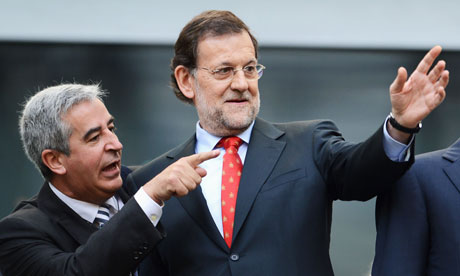Spain's acquiescence to a bailout of as much as €100
billion ($125 billion) for its banks is a prelude to a much bigger
question: Will Spain need a bailout for itself?
Many in financial markets say it ultimately will, and that Spain
faces a daunting struggle convincing reluctant creditors that the
country is a viable lending target.
For Europe, that remains the vital issue. A full bailout of the euro
zone's fourth-largest economy would be a potentially cataclysmic event.
Spain's economy is larger than those of Greece—which faces a pivotal
vote on Sunday—Portugal and Ireland combined. Finding the funds for a
rescue would greatly strain the euro zone's bailout vehicles.
The question of a broader bailout follows Saturday's announcement
that Spain would accept as much as €100 billion in aid with the intent
of funneling the money into its ailing banking sector.
Officials sought to portray the move as a limited intervention that
falls short of the other euro-zone rescues—which have come with painful
overhauls of entire economies.
Even as Spain accepts help, many eyes are on the elections in Greece,
the home of Europe's most painful overhaul. Sunday's vote pits a
mainstream party that supports the country's bailout measures against an
upstart party, Syriza, that wants to renegotiate the deal.
The two sides are running neck and neck, and officials fear a
decisive win by Syriza could raise the odds of a fracture in the
currency union and trigger further tumult in the Spanish financial
sector.
There is enough tumult in Spain as it is. Its economy is flailing and
the country has seen foreign investors flee from its government bonds
all year. That has created a pressing worry: How will Spain pay for its
sizable government deficit, officially projected at 5.3% of gross
domestic product but widely expected to be larger?
Early this year, Spanish banks picked up the slack, but now they are
backing off. Spain says it needs to borrow €86 billion this year to
cover deficits and repay maturing debt; it has raised €48 billion so
far, leaving it to find a further €38 billion from capital markets. By
turning to its euro-zone peers for help with its banks, Spain is tacitly
admitting money will be hard to find.
"What you have to say now is that Spain is likely to lose access to
the bond markets completely at some point," said Justin Knight of UBS in
London. "It has demonstrated to everybody that market access is limited
by requesting aid."
In the short term, market analysts said, Spain's bonds could see a
boost. The European aid for banks means Spain won't have to issue new
bonds right away to fund the rescue. The Spanish government-bond market
rallied last week in anticipation of an aid deal, and 10-year bonds
yielded 6.25% Friday, off the peaks above 6.7% on May 30.
Helen Haworth, head of European interest-rate strategy
for Credit Suisse in London, said there could be a bit of a relief rally
this week. But fundamentally, she said, "to me, there is still no buyer
of Spanish debt beyond the domestic investor base, which is basically
the Spanish banks."
That has been Spain's problem for months: With foreign investors
almost completely absent, Spanish banks have propped up the government,
which is now forced to turn to Europe for help propping up the weaker
banks. Meanwhile, the stronger banks are shying away from buying
government bonds—for fear they would be dragged down, too.
That knot between the government and its banks has been devilishly
difficult to untie. Ireland couldn't do it, and its banks' huge losses
eventually demolished public finances and thrust the country into a
bailout program.
After a meeting of European finance officials Saturday, Spain said it
would try to cut the knot by soon requesting aid from the euro zone.
Those funds, coming from the euro zone's bailout vehicles, would be lent
to Spain, which would take stakes in troubled banks in return for cash
or bonds.
The plan is short on details, particularly on what would be demanded
of Spanish banks in return for the help—a reflection of the speed with
which the plan was assembled. A senior euro-zone official involved in
the discussions said the governments moved quickly because "Spain was on
the verge of being unable to finance itself on the markets."
Spain will lose control over the supervision of its banks to
international and European authorities, who will scour the banks' books
and may order banks to shed assets—or even demand the closing of lenders
seen as unviable.
The bailout will help Spain in one clear way: It is a low-cost means
of rapidly cobbling together large sums that Spain would otherwise have
had to pay dearly for—if it could find anyone to lend to it at all.
But it comes with a number of pitfalls. First, economists and market
analysts point out, the costs of the bank rescue still fall on Spain: It
must repay the European loans.
Second, the parameters of that aid make it more difficult for Spain
to raise additional money. That is because lending from the European
Stability Mechanism, the new euro-zone bailout fund that is expected to
handle the bulk of the aid, is intended to have a "senior" creditor
status: The ESM is meant to be repaid before holders of regular Spanish
bonds if Spain were to default on its debts.
Mr. Knight of UBS said "the fear that bondholders are subordinated by this" will make investors reluctant to buy Spanish debt.
If Spain is to avoid its own bailout, it will have to convince
lenders its banking problems are under control. That isn't easy:
Ireland was forced to take aid after repeatedly underestimating the
extent of its banks' problems. And then Spain will need to convince
lenders that, banking problems aside, it can survive.
To that end, Europe's strategy—and now Spain's—is to present the
bailout commitment as a limited support program, far from the intrusive
rescues that were needed for Greece, Portugal and Ireland. Thus, Madrid
won't see the regular visits from the troika of the European Commission,
the European Central Bank and the International Monetary Fund to go
through government books and closely check on the implementation of
promised spending cuts and overhauls.
"There will be no new conditions in other areas like fiscal policy
and structural reforms," European Union Economic Affairs Commissioner
Olli Rehn said Sunday.
It will be a tough sell. Spain's banking-sector problem is a deep one
but not the only one the government faces. The economy is contracting
viciously and unemployment is staggeringly high. The central government
has had difficulty controlling the finances of its regional governments.
The continuing implosion of its property bubble pushed Spain back
into recession in the first quarter and almost one in four workers is
without a job. The unemployment rate among young people is near 50%.
Prime Minister Mariano Rajoy on Sunday warned against expecting a quick turnaround following the banking rescue.
"This year is going to be a bad one, growth is going to be negative
by 1.7%, and also unemployment is going to increase," he said.
That leads many to conclude Spain will have an even larger
deficit—and need even more borrowing from capital markets—than it now
projects.
"At the end of the day, we also know that the Spanish regions are
going to need a lot more funding than has been assumed," said Ms.
Haworth of Credit Suisse. "The Spanish deficit forecast of 5.3% is
clearly not going to be met."
Pavan Wadhwa, a strategist at J.P. Morgan, said Spain
faces a trio of problems: a troubled banking system, an overextended
government and an economy in tatters. With the aid, he said, "you have
resolved one of three things, so you might actually see a relief rally
on Monday. But a relief rally is not going to last for a very long
time."
—David Román, Santiago Perez
and Jonathan House in Madrid
contributed to this article.
Like found at:
http://online.wsj.com/article/SB10001424052702303768104577458562351966868.html

